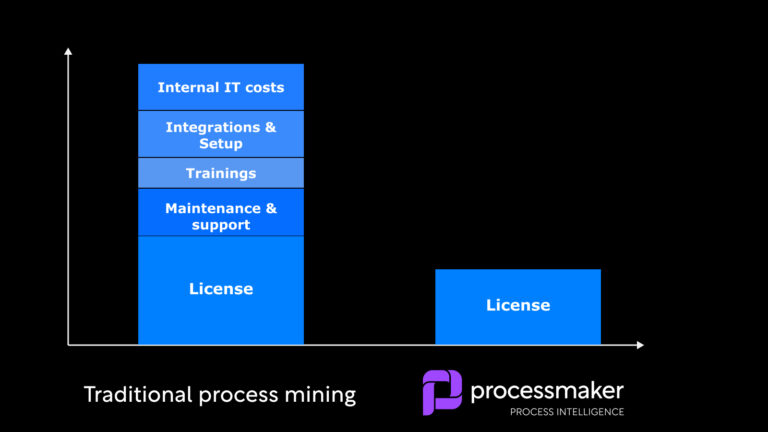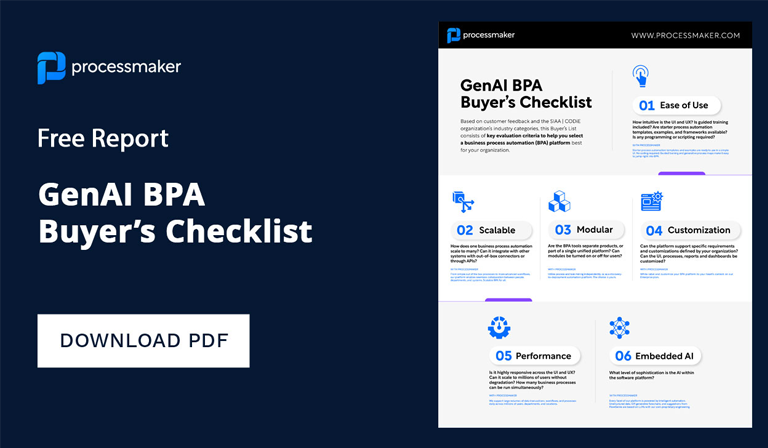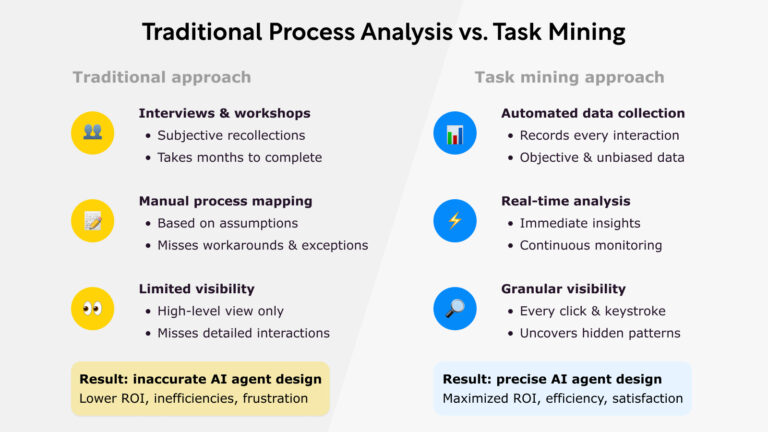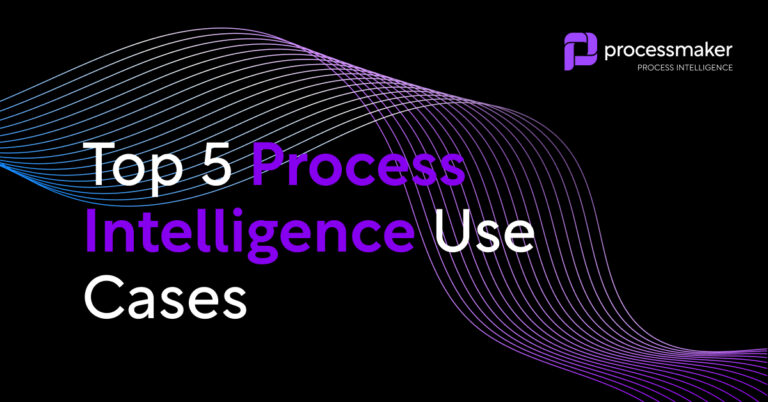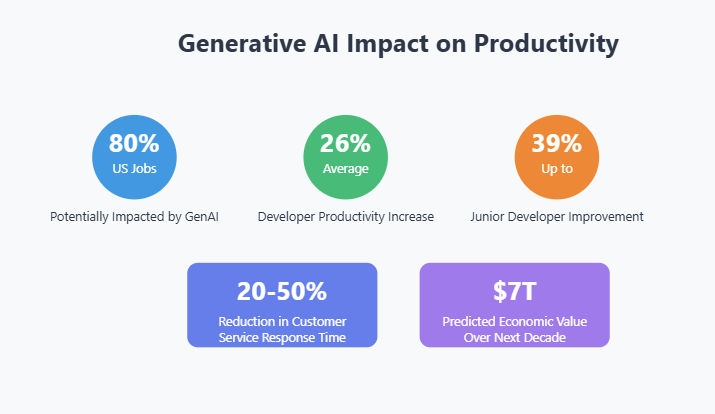Process mining offers significant business value, but what are the actual costs involved?
In this article, we will highlight key expenses to consider, including license fees and implementation costs. Additionally, we will present a cost-effective alternative, so sit back and take note.
Building the case for process mining
Process mining is an increasingly popular method used by businesses to gain insight into their processes. It combines data mining and business process analysis to provide a visual representation of processes, identify bottlenecks, and discover potential improvements.
In today’s digital age, businesses produce an enormous volume of data. By harnessing this data through process mining, companies can refine their operations, boost efficiency, and ultimately enhance their profitability. The benefits are evident, but what about the resources needed to achieve this?
Process mining pricing models
There are over 30 different process mining software solutions available in the market, each with its own pricing model. Depending on whether you are a large enterprise buyer or looking for a small business-friendly solution, you may come across different pricing models. Here are some of the common models:
Software as a Service – or SaaS, is a software licensing model where users pay a subscription fee to access the software, typically on a monthly or annual basis. This model is becoming increasingly popular for process mining as it offers flexibility and reduces the need for large upfront investments. The cost generally includes updates and support, and the software is usually hosted in the cloud, reducing the need for additional hardware.
Usage-Based Pricing – pricing here is based on how much a user utilizes the software or service. This may be measured by factors such as data consumption, user count, transaction volume, or other relevant metrics. Many process mining solutions adopt a hybrid approach, combining SaaS and usage-based pricing models tailored for enterprise businesses.
Tiered Pricing – in this model, software is priced based on different tiers or levels, each offering more features, services, or capacity than the previous one. Some process mining vendors include a tiered pricing option in a SaaS subscription as the implementation of the solution is scaled out in an enterprise.
Perpetual License – this is a one-time purchase of the software where the user owns a license to the software indefinitely. It usually involves an upfront cost and may have an additional annual fee for maintenance and support. Perpetual licensing is less popular in process mining.
Let’s cut to the chase. Regardless of how the pricing model works, you can consider the cost to start doing process mining as a platform cost.
How much does process mining cost?
The platform costs of process mining software licenses typically range between $5000 and $150,000 in 2023. The platform costs for large enterprise organizations may even be higher. For large organizations establishing a process mining Center of Excellence, license costs often start from $1 million and above.
Are there free process mining options?
Many process mining solutions offer either a free trial or a proof of concept with project-based pricing. For a completely free-of-charge option, you can consider ProM Tools that are offered within a GNU Public License (GPL) open-source license.
How much do popular process mining solutions cost?
Many process mining solutions do not publicly share their pricing, or the costs are significantly influenced by the scope of data mining, integration, and implementation needed. Below, you can find a high-level overview.
Celonis
Celonis does not publicly confirm their pricing. The cost of Celonis depends on your needs and scope of implementation. There may also be different pricing options available depending if you’re buying directly or through an authorized partner. On the low end, Celonis offers a free plan with limited functionality (formerly called Celonis Snap.)
UiPath Process Mining
UiPath’s Process and Task Mining solutions are offered as part of their Enterprise pricing plans. The vendor does not disclose the exact pricing. In addition to a standard licensing fee, you may expect to get module-based pricing depending on how actively you utilize UiPath’s platform.
IBM Process Mining
IBM Process Mining is offered on a Software-as-a-Service basis, starting with a price of $3,200 per month for one analyst user and 20 million events (as of October 2024.) The vendor also offers consumption-based pricing and on-premise pricing options and overall pricing may be dependent on the number of users and implementation scope.
Time and effort needed for process mining implementation
License fees are only one part of the total cost of process mining implementations. Another important factor is the time and effort needed for ramping up process mining capabilities.
The way process mining tools work is that you integrate each enterprise resource system separately to extract event logs. These manual extractions or data integrations need significant skilled work from data mining professionals, project managers, integration specialists, and IT system owners.
As a result, it is not unusual for a process mining implementation to take 12-24 months and require multiple full-time equivalents (FTEs) of internal resources to get off the ground.
A rough estimate is that implementation can take up $50-100k of work-related cost per process that is being analyzed within the first year.
What impacts the work-related process mining costs?
For some companies, process mining can be a simple endeavor, while for others, it may require significant IT resource investment. Three key factors influence the work-related costs associated with process mining.
Company maturity level
The first consideration in assessing work costs is the maturity of the company’s process data infrastructure. Is all process data stored in a data lake readily accessible for process mining, or is the raw system data scattered across various databases?
Another key aspect of maturity is the level of expertise available within the company to spearhead process mining initiatives. This includes evaluating how much external support, such as expert consultants, is needed to complement in-house capabilities.
IT landscape
Are IT systems that support process mining initiatives readily accessible, or are they often tailored to specific industries or customers, requiring considerable manual effort to obtain and clean the necessary data? Transforming system logs into usable event logs for process mining algorithms can be challenging. For instance, the SAP ERP ecosystem generally offers good data availability and connectors to related tools. In contrast, accessing data from other ERPs or legacy systems may necessitate more customized solutions.
Process landscape
The third factor influencing work cost is the process landscape. Is the process under analysis standardized, allowing for easy monitoring and adherence through readily available templates from process mining vendors? Or is it an industry-specific or customized process that necessitates greater manual effort to derive value?
Tallying up the total cost of ownership
License fees and FTEs are not the only costs of process mining you need to factor in. There are additional costs that you are likely to incur in a process mining implementation:
- Maintenance and support
- Training of employees
- Cost of additional implementations/integrations
In many cases, the cost of process mining solutions scales up significantly after initial implementation as more processes and systems are added. It’s not unusual for running costs to increase 3-5x as more processes are covered.
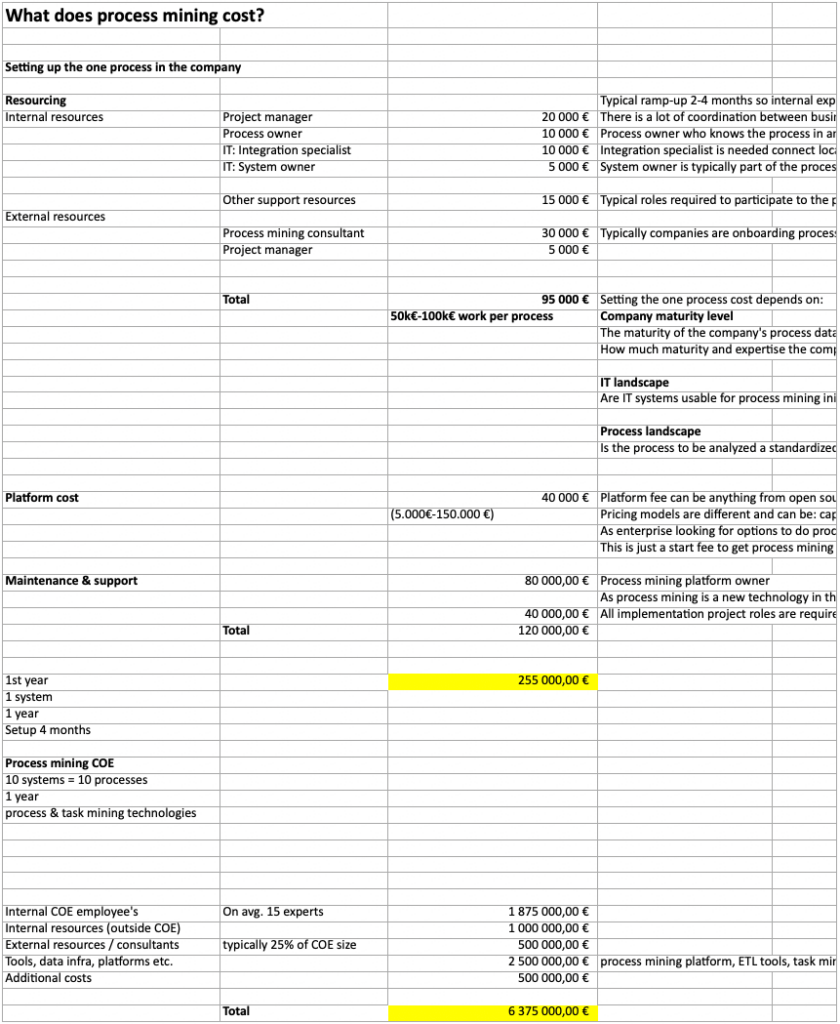
You can see an estimate of the typical costs of process mining implementation.
An affordable, scalable option to conventional process mining
If you’re still on the fence and concerned about the high costs of process mining- it’s useful to know you have an option.
Hybrid process intelligence solutions such as ProcessMaker PI offer the advantages of both process mining and task mining, all while demanding considerably fewer resources and costs. These solutions provide valuable insights for process improvement and automation, eliminating the complexities associated with extensive data implementation and integration.
In practice, hybrid process intelligence leverages an innovative solution that eliminates the need to extract event logs from IT data systems. It provides immediate end-to-end visibility across multiple systems through plug-and-play generative AI event logs, which are generated directly from business applications and the user interface.
Hybrid process intelligence offers valuable process insights without the need for separate integration into ERP systems or other databases. This approach allows you to navigate complex business processes while achieving significant cost savings.
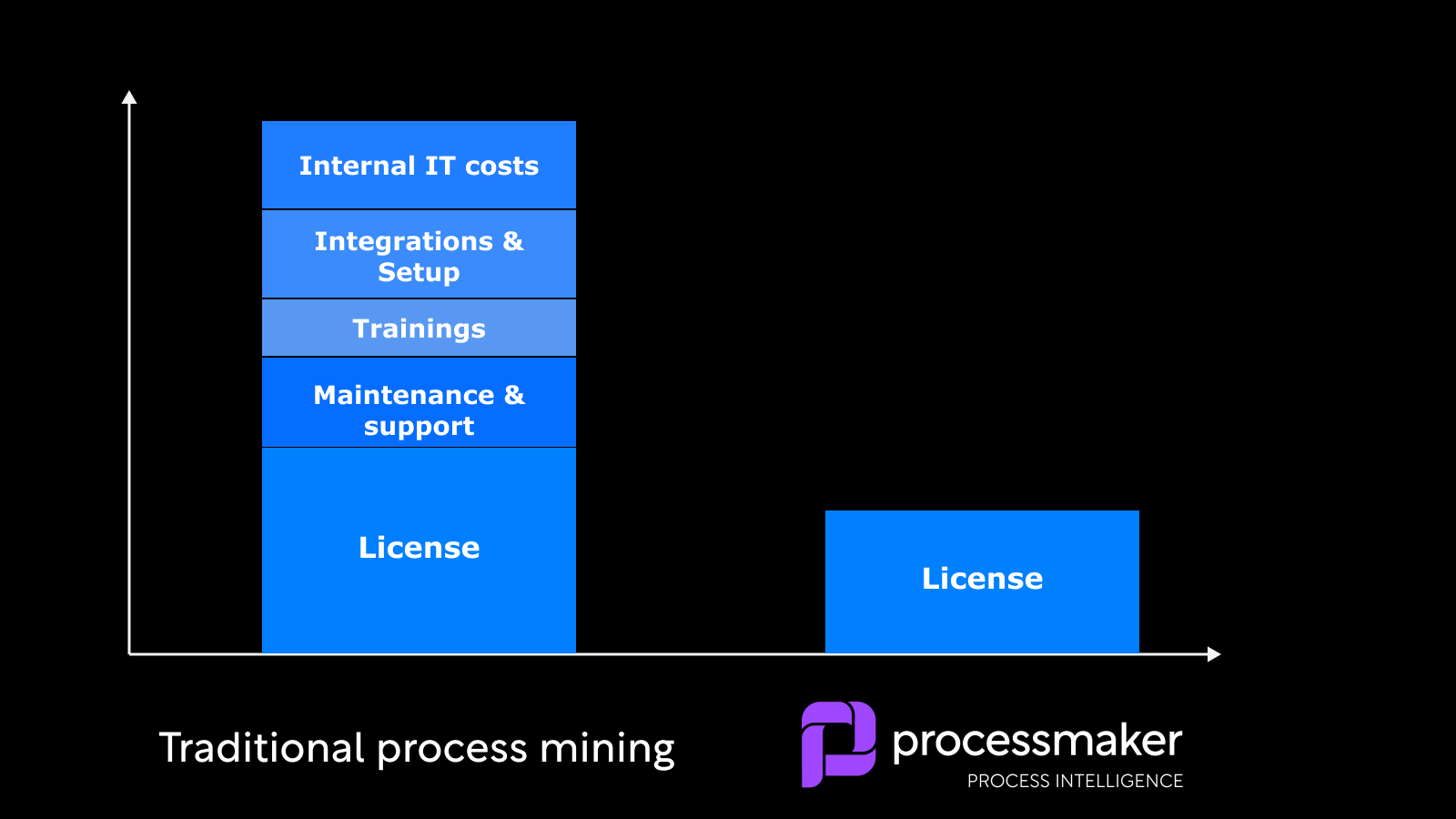
Above you see a total cost of ownership (TCO) comparison between process mining and a new hybrid process intelligence option by ProcessMaker.
The choice is yours
In this article, we’ve outlined some of the expected costs of process mining implementation to help you make educated decisions and consider your alternatives in process intelligence solutions.
Both process mining and hybrid process intelligence are powerful tools to analyze business processes. They both give you the benefits of process discovery, conformance checking, and insights for implementing other intelligent automation technologies.
If you’re seeking a hassle-free solution without the complications of data integration and implementation, consider exploring a whitepaper that delves into the technology behind ProcessMaker’s process intelligence tool.
Process mining Q&A:
1. How much does process mining cost?
The cost of process mining can significantly vary based on several factors. These include the software license fees, which can range from free for basic tools to several thousand dollars for advanced solutions. Additionally, implementation costs—covering training, hardware, and infrastructure—must be considered, along with ongoing expenses for maintenance and updates. Moreover, factors such as the size of your organization, the complexity of your processes, and any necessary customizations can further impact overall costs.
2. Is process mining worth it?
In many cases, process mining proves to be a valuable investment for businesses. It allows businesses to gain deep insights into their processes, identify bottlenecks, uncover potential improvements, and drive efficiencies. This can lead to cost savings, improved productivity, better compliance, and more informed decision-making. However, like any investment, it’s important to conduct a thorough cost-benefit analysis to ensure the potential benefits outweigh the costs.
3. Are there free process mining tools and software?
Several free process mining tools and open-source solutions are available for use. Additionally, some commercial vendors provide complimentary options for academics and students.
4. What are the pitfalls of process mining?
While process mining can offer significant benefits, there are potential pitfalls to be aware of. These include the risk of inaccurate data leading to misleading results, the potential resistance from employees due to perceived scrutiny, and the need for skilled personnel to interpret the data and implement changes. Furthermore, process mining can be costly and time-consuming to implement, and there could be hidden costs such as data preparation or process changes following the analysis.
5. How much does Celonis cost?
The cost of process mining software can vary greatly depending on the size of your organization, the complexity of your processes, and the specific features you require. In addition to license fees, there may be additional costs and resources needed. For the most accurate information, contact vendors directly for a quote.
